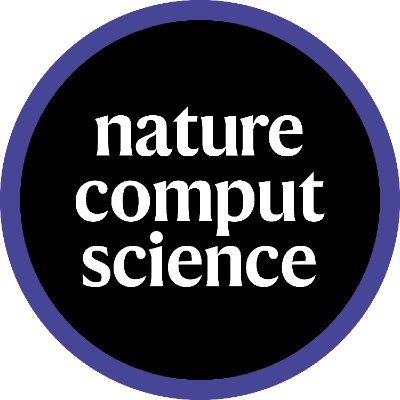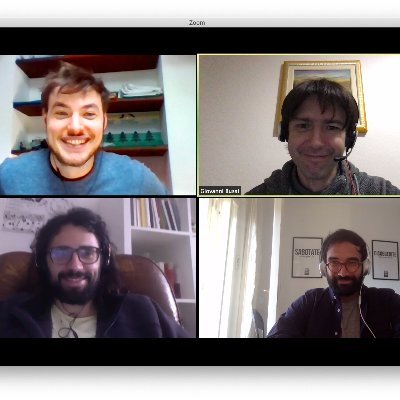
Thorben Fröhlking
@TFroehlking
Followers
65
Following
79
Media
0
Statuses
52
PostDoc Researcher @gervasiolab, UNIGE | PhD Researcher @bussilab, SISSA | machine learning, RNA force fields, MD matching experiments
Joined June 2020
The corresponding News & Views from @gervasiolab, @TFroehlking and Simone Aureli is now live! https://t.co/jQ6Qae9f6b 🔓 https://t.co/m7LtYEbCWC
0
3
3
🚀Introducing MDRefine: our new #python package for integrating experimental data with #moleculardynamics trajectories through diverse reweighting methods! Check out the #preprint: https://t.co/Hzuf6rQ9HA. Summary in thread 🧵:
arxiv.org
Molecular dynamics (MD) simulations play a crucial role in resolving the underlying conformational dynamics of molecular systems. However, their capability to correctly reproduce and predict...
1
6
30
MDRefine: a Python package for refining Molecular Dynamics trajectories with experimental data • MDRefine is a novel Python package that refines molecular dynamics (MD) simulation trajectories by integrating experimental data, improving alignment with observed molecular
0
15
32
🚀Excited to share our #preprint on implementing constant pH metadynamics for #RNA oligomers! Check it out here: https://t.co/xM5UGFQBvj. Thread 🧵:
1
3
11
Excited to see our work on accelerating DeepLNE++ published in @JChemPhys at https://t.co/IxxjQLm0bH The updated link for tutorials: https://t.co/2IdfSI5c8d Many thanks to @ValerioRizzi33, Simone Aureli, and the entire @gervasiolab. Summary below: https://t.co/Ev5T0Tt1jF
github.com
DeepLNE speed-up via knowledge distillation. Contribute to ThorbenF/DeepLNE_PlusPlus development by creating an account on GitHub.
Checkout our #preprint of our latest manuscript on DeepLNE++, our new and improved deep-learning path-like collective variable https://t.co/BOL3QjfoQ6 by @TFroehlking, @ValerioRizzi33, Simone Aureli, @gervasiolab . Summary in thread:
0
4
10
Your comments and feedback are welcome and will improve our manuscript during the review process.
0
0
0
#Jupyter notebooks are available at https://t.co/sHamp0zE5H and more data can be found at
zenodo.org
Supporting data related to manuscript 'DeepLNE++ leveraging knowledge distillation for accelerated multi-state path-like collective variables'
1
0
0
DeepLNE++ uses a knowledge distillation approach to speed-up the evaluation of DeepLNE models, allowing to compute free energy landscapes for large and complex biomolecular systems. Now we can also encode system-specific knowledge within a supervised multitasking framework.
1
0
0
We introduce DeepLNE++, an accelerated version of our path-like #DeepLearning CV, DeepLNE. It still provides the path-constructing variables s and z as a non-linear combination of several descriptors, effectively approximating the reaction coordinate.
1
0
0
Checkout our #preprint of our latest manuscript on DeepLNE++, our new and improved deep-learning path-like collective variable https://t.co/BOL3QjfoQ6 by @TFroehlking, @ValerioRizzi33, Simone Aureli, @gervasiolab . Summary in thread:
1
2
3
Excited to share my 1st independent preprint on data-efficient #ML potentials for catalytic & chemical reactions with @perego98💥 ➡️Uniformly accurate reactive MLPs with ~1k DFT calculations How❓Enhanced sampling + on-the-fly selection+ GNNs https://t.co/fOopkgVWBb Short📜⤵️
2
18
71
Our paper with @TFroehlking @ValerioRizzi33 & @LuigiBonati on learning path-like collective variables with autoencoders is now out in @JChemPhys ! This is the latest step in a journey that began with "From A to B in Free Energy Space".
pubs.aip.org
Several enhanced sampling techniques rely on the definition of collective variables to effectively explore free energy landscapes. The existing variables that d
0
12
41
@LuigiBonati @JChemPhys @TFroehlking @ValerioRizzi33 Thrilled to announce our approach to learning path-like collective variables using a generalized autoencoder, now out in @JChemPhys! This is the culmination of a journey that began with “From A to B in free energy space”. We get highly effective paths for enhanced sampling.
0
3
10
New paper out in @JChemPhys with @TFroehlking, @ValerioRizzi33 and @gervasiolab: learning path-like collective variables via a generalized autoencoder performing dimensionality reduction and continuous k-NN to tether the CV to training data https://t.co/S8V9EYKa02
#ml #compchem
pubs.aip.org
Several enhanced sampling techniques rely on the definition of collective variables to effectively explore free energy landscapes. The existing variables that d
1
9
59
New preprint! A synergistic combination of machine learning of collective variables with transition path sampling, with visiting PhD student Jintu Zhang https://t.co/8g8zqo4QNP
#compchem #machinelearning #enhancedsampling (1/3)
arxiv.org
Rare event sampling is a central problem in modern computational chemistry research. Among the existing methods, transition path sampling (TPS) can generate unbiased representations of reaction...
3
9
47
Our new strategy for cryptic pocket detection, SWISH-X is out in @JCIM_JCTC! https://t.co/ObCLLksPUO It combines SWISH's Hamiltonian replica exchange with expanded ensemble sampling with OPES to speed up cryptic pocket exploration. 1 / 🧵
pubs.acs.org
Protein–protein interactions mediate most molecular processes in the cell, offering a significant opportunity to expand the set of known druggable targets. Unfortunately, targeting these interactions...
1
15
37
Your comments and feedback are welcome and will improve our manuscript during the review process
0
0
0
#Jupyter notebooks are available at https://t.co/RWYnWSGqAU and more data can be found at
zenodo.org
Supporting data related to manuscript 'Deep learning path-like collective variable for enhanced sampling molecular dynamics'
1
0
0
Advantages of our 'DeepLNE' CV are: automatic metric selection, learning paths without landmarks, closely approximating ideal reaction coordinates. We showcase its effectiveness in molecular dynamics simulations, accelerating transitions and estimating free energy of folding.
1
0
0









